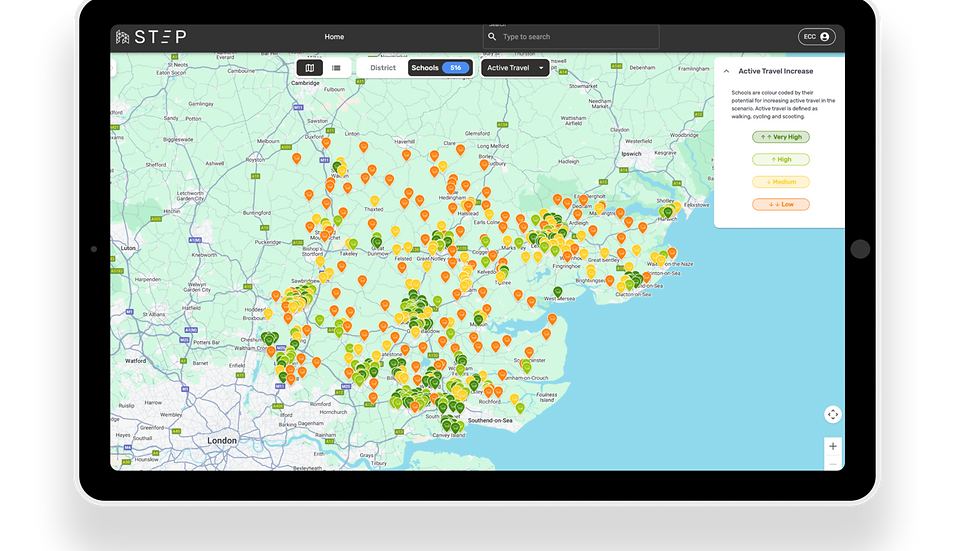Revolutionising the School Run with HomeRun STEP
- Pooya Kamvari

- Jul 28, 2025
- 4 min read
Updated: Jan 19
The school run in the UK has long been one of the most persistent and complex transport challenges facing local and central authorities. A combination of entrenched systemic factors and institutional inertia has made the problem difficult to address. Now, with the advent of HomeRun STEP, a ground-breaking AI-powered school travel analysis platform developed in partnership with Essex County Council and funded by the Department for Transport through Innovate UK, the game may be about to change.

Why the School Run is Getting Worse
A uniquely uneven education system, growing parental choice, and long-standing underinvestment in school transport have led to millions of children travelling further to school than ever before, particularly in rural areas. Local authorities, saddled with surging home-to-school transport costs (now close to £2 billion annually for SEN students alone), have pared back services to the bare legal minimum. Meanwhile, bus networks have been decimated: 37% fewer pupils take the bus to school today than in 2010. With walking and cycling rates also dropping, particularly outside London, car dependency is rising fast.

Despite decades of initiatives, the school run is getting worse. Why? Some key contributing factors include:
95% of schools do not have up-to-date travel data, making targeted intervention nearly impossible.
Councils lack scalable tools to identify and act on areas of need.
Schools, overstretched and under-resourced, are rarely able or incentivised to engage in travel planning frameworks.
In the private sector, the situation is deteriorating further. With VAT changes threatening their finances, many independent schools are abandoning even minimal efforts to reduce their transport impact. Instead, they are marketing more aggressively to distant catchments.
Introducing HomeRun STEP
Founded by Pooya Kamvari, HomeRun has spent nearly a decade working on school travel. Drawing on insights from its digital platform, HomeRun App, and deep sector engagement, the team identified the urgent need for high-quality school travel data that didn’t depend on school engagement.
That breakthrough came through machine learning and AI.
Using anonymised postcode data from local authorities, and trained on millions of data points from real-world school journeys, HomeRun STEP models and analyses every individual journey to school. The platform efficiently:
Maps and analyses multimodal journey options
Accurately predicts most likely current travel modes
Models modal shift scenarios using realistic behaviour change assumptions
Targets and quantifies high-impact interventions (e.g. School Streets)
Importantly, it does all this at scale and without the need for costly (often impractical) school engagement. None of this would have been possible even five years ago. The ability to apply machine learning across complex, high-dimensional datasets is what allows STEP to operate at county and national scale—automating what was previously a labour-intensive, small-scale, and often inaccurate process.

The Essex Pilot: A Breakthrough Moment
Partnering with Essex County Council (ECC), HomeRun undertook one of the most ambitious school travel data pilots ever attempted. STEP modelled school travel for over 210,000 pupils across 518 public schools. Previously, ECC had the capacity to work with just 35 schools a year. Now, they can target every school in the county with data-led insight.
ECC have already:
Used STEP to inform a major DfT funding bid for 30 School Streets (one of the largest outside London)
Begun reallocating officer time and programme investment based on STEP’s impact data and behavioural modelling
Replaced reactive, blanket engagement with targeted outreach to schools with the greatest need and modal shift potential

“STEP is allowing us to pinpoint where and which interventions will work best for our schools and areas, saving time, money, and effort,” said Helen Akapabio, ECC’s Active Travel Manager. “The equity implications are also profound. For the first time, all schools in Essex are assessed on a level playing field — no longer dependent on PTA enthusiasm or staff bandwidth. Interventions can be focused where they are most needed, not where engagement is easiest."
The Road Ahead
HomeRun STEP is already attracting national attention. Senior figures at Active Travel England have described the platform as “light years ahead” of current approaches. Local authorities across the country are beginning to adopt the STEP pilot programme.
And the timing couldn’t be better. On 2nd July, the Mayors of England’s Combined Authorities signed a national pledge to prioritise walking, wheeling, and cycling, with a “first focus on the school run.” But intent is not enough. Without tools like STEP, many councils won’t know where to start.
Pooya Kamvari, HomeRun Founder and CEO: “If the trends we’ve seen in Essex were scaled nationally, we could ramp up active travel on the school run, take 650 million car trips off the road, slash peak-traffic emissions, and reshape communities around healthier, active, more sustainable transport. That’s the power of using data and AI ethically, turning good intentions into real-world impact.”
Until August 2025, HomeRun is offering a pilot package that offers minimal procurement effort and incredible value for money.
Get started quickly and easily with visual travel intelligence for schools across your region - no engagement or school implementations are required!
HomeRun STEP Team